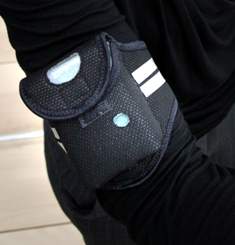Location technology enables people with dementia to go out safely
19 June 2008
A project facilitated by Cels, an organisation driving North East England's healthcare sector, aims to counter social and practical problems caused by dementia with the launch of two portable location-tracking devices.
The Keeping In Touch Everyday (KITE) project is developing technology that allows people with dementia (PWD) to take part in the activities they enjoy with the knowledge that their family can track their whereabouts if they require assistance.
The latest prototypes are designed to assist people in the milder stages of dementia to cope with ‘wandering’ and in doing so allow them to maintain or reclaim a sense of independence. The prototypes were based on the needs of two people in particular — one who likes to go jogging, and another who enjoys driving and the independence it brings.
 |
| The location device worn in a pouch on an armband |
The first device is designed for a person with dementia who still enjoys running, and is worn as an armband. The device is not obtrusive to the user and could easily be mistaken for an mp3 holder or something similar. The device has a microchip in it, which is linked to the mobile phone of the runner’s carer. It tracks where he is going, in a similar fashion to a satellite navigation system. This way the carer knows where the runner is the whole time he is away, and if he loses his way he can activate a ‘panic button,’ and the carer can locate and assist him.
“The person we modelled the device on always wears his watch when he goes out for a run, so we wanted the device to have a similar look and feel, so that he would not think twice about putting it on and it would become part of his routine. The difference is, this has the added benefit of giving both him and his partner piece of mind, meaning he can enjoy his freedom and independence without being worried about losing his way.”
The second prototype is tailored for the needs of someone with dementia who uses a car to get about and enjoys the independence and freedom of driving on her own. She makes sure she always carries her leather notebook with her, which she uses to write notes and shopping lists etc in. Following discussions with the individual, it was decided that to help her and her carer a chip would be embedded into her notebook. An object she always carries with her and feels comfortable with. The technology embedded in both prototypes is a GSM/GPS–type localisation device, and it sends signals to a nominated carer so, should the need arise, they can find out where she is.
KITE have worked closely with PWD and their carers through several focus groups and workshops, facilitated by experts within Newcastle University, to ensure the new technology meets their needs.
Cels supported the project through their Assistive Technology Lab (ATL) which is focused on bringing to market technology to aid an ageing population.
Caroline Findlay, Project Manager at Cels commented, “Initiatives such as KITE are vitally important to the region and to society as a whole, because they address the needs of an increasingly ageing population. Over the last five decades there has been a 45% increase in the number of people aged 50 and over and this is expected to rise by a further 36% by 2031. Dementia is a very real issue and advances in technology can really help those who live with it.
The financial cost of caring for those people with dementia is placed annually at £4.6 billion pounds. In addition to the major financial problems there are the strains for those who care for PWD, such as requirements on time and the unprecedented stresses of their work and responsibilities.”